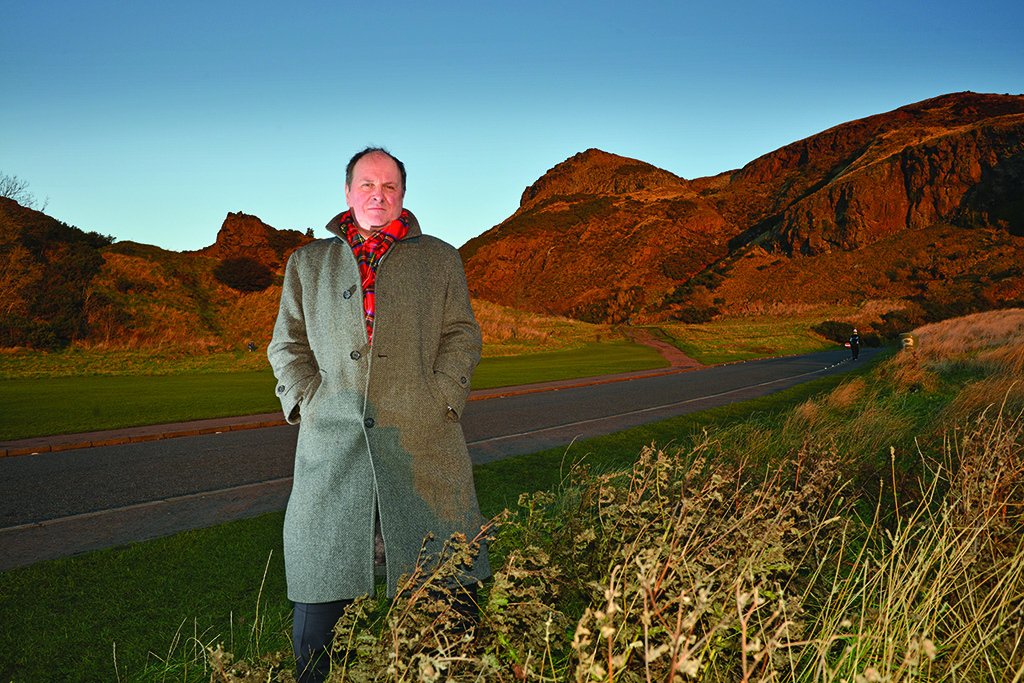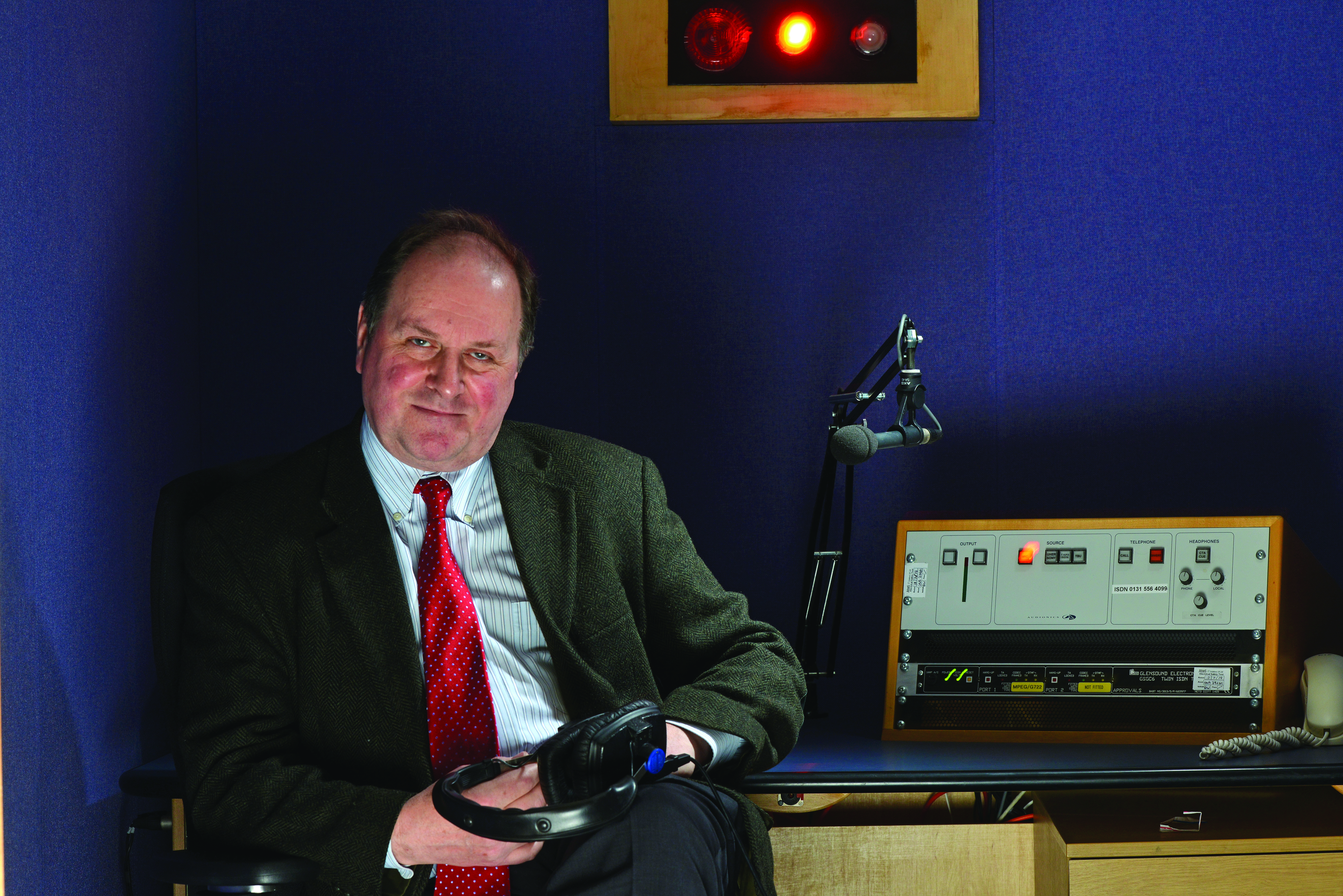When James Naughtie was finishing his English degree at Aberdeen University, his careers advisor saw a great future ahead – in hospital administration.
Naughtie – Jim in everyday life, James for BBC purposes only – was underwhelmed. ‘You clearly know nothing about me,’ he recalls telling the hapless academic. ‘I couldn’t administer the Sunday School picnic.’
He inquired tentatively about journalism. ‘Ho ho ho,’ the careers expert replied. ‘Nobody gets into journalism.’ Publishing, then? Cue even louder laughter, followed by Naughtie’s hasty exit.
Experts shmexperts. Not only is Naughtie one of the foremost journalists of his generation, he has succeeded in his fallback career as well.
With three non-fiction books to his name, he has just finished his first novel. ‘I always felt I wanted to write, to tell stories,’ he says. ‘There is a danger of that sounding a bit pompous. But I never thought I’d like to join a bank.’
And so it turned out that bedpan ordering’s loss was the media’s gain, and Naughtie’s career trajectory was steep: covering his home turf with The Press & Journal in Aberdeen, Westminster for The Scotsman, then the same beat for The Guardian. He moved to radio in 1986 and joined the Today programme, which he remained with from 1994-2015.
It’s one of the best jobs in British journalism, but is it worth the 3am starts and what amounts to two decades of jetlag? ‘You don’t ever get used to it,’ he says. ‘Sometimes you find yourself running on adrenaline.’
To cover the American primaries, the fall of the Berlin Wall and the fallout from 9/11, however, he is prepared to set the alarm clock. ‘Usually, when someone asks you to come in at 4am, the answer is: piss off. But to present the Today programme?’ he laughs. ‘I’m not being precious about it. Farmers get up at whenever. It’s just what I do.’

Broadcaster James Naughtie (Photo: Angus Blackburn)
Dotting between the studios of London, Glasgow and Edinburgh has not dulled the 62-year-old’s appetite for frontline reporting. ‘Over
the last few years Today has let presenters get out on the road more,’ Naughtie says approvingly.
‘It really sharpens you up. I’ve had two or three trips to Egypt, right in the thick of it.’
He warms to his subject. (Brevity, as he is first to admit, is not his strong suit.) ‘Radio is all about rhythm, cadence, immediacy, making
a connection with the person who’s listening. It’s about pulling them in, explaining why they need to listen for the next four minutes. You don’t want to turn it into a piece of crude showmanship but’ – he grins – ‘you’ve got to get them into the tent. Otherwise they won’t
see the show.’
Despite having a schedule that would keep a man half his age busy (Today, Good Morning Scotland, the monthly Radio 4 Book Club, oneoff series such as this year’s The New Elizabethans, a monthly interview for BBC Music magazine, presenting the Proms), Naughtie has found time for fiction. His first novel, The Madness of July, was published in February 2014.
Set in Westminster and Washington and featuring spy-turned-Foreign Office minister Will Flemyng, it’s Tinker Tailor/House of Cards. And while Naughtie hopes he has come up with a gripping political intrigue, what he really wanted to explore is a non-party fault line
observed over his years on the press bench.
‘It involves the destruction of friendships by rivalries, which is the story of politics,’ he explains. ‘The various relationships in the book are driven by the central character’s knowledge that the most difficult thing to handle isn’t policy or a negotiation with the Treasury, important as those may be.
‘The more successful you are, the more you realise it will destroy your friendships, because that’s inevitable. The pyramid narrows. Look at the Miliband brothers. Look at Blair and Brown. The people who know, before they start, what the inevitable end is going to be, have a slightly melancholy, world-weary understanding of the pain as well as the joy.’

Broadcaster James Naughtie (Photo: Angus Blackburn)
He pauses for a self-deprecating chuckle. ‘This is not Dostoyevsky. This is a thriller. It’s a mystery, there’s a denouement. I hope it’s a gripping story.’
What it’s not is a roman à clef. Naughtie decided straight away that he would not say whether the government was Tory or Labour.
‘I was never going to name anyone real. It’s sort of set in 1976, a hot summer. The places and the cities are real. The characters have elements of people I’ve known, of course, but there is no thinly disguised Mr X. That becomes tedious, a silly game for the reader.’
Like brevity, tedious and silly games are not Naughtie’s strong suits. Exposing what goes on behind the locked doors along the corridors of power, however, is. ‘The story engulfs a group of people at the heart of government in Washington and London. It’s one of the biggest crises of their lives; it has huge implications for them, their friends, the governments for which they serve. But no one outwith their coterie has
the faintest idea this is happening.
‘That, in the end, is one of the lures of journalism. It’s saying: this is what it’s like, this is what’s going on.’ He smiles. ‘You’re not revealing Watergate every day, but you are getting behind the curtain.’
With so much to look forward to, Naughtie brushes off the idea of retirement like a badly briefed special advisor. ‘As long as someone
wants me to write something or broadcast something, I will.’ He’s already planning novel number two. ‘I rather like this guy. I think he’ll reappear.’ That self-deprecating laugh again.
‘But people need to buy it first.’
- This feature was originally published in 2014.
TAGS

